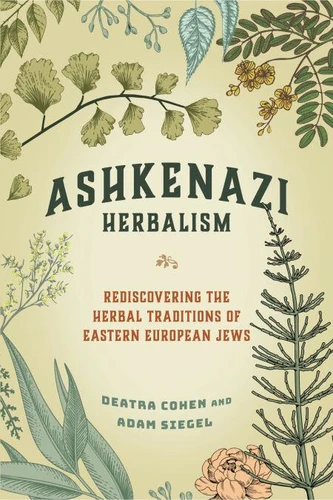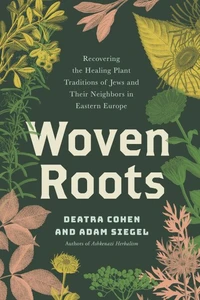Ashkenazi Herbalism. Rediscovering the Herbal Traditions of Eastern European Jews
Par : ,Formats :
Disponible dans votre compte client Decitre ou Furet du Nord dès validation de votre commande. Le format ePub protégé est :
- Compatible avec une lecture sur My Vivlio (smartphone, tablette, ordinateur)
- Compatible avec une lecture sur liseuses Vivlio
- Pour les liseuses autres que Vivlio, vous devez utiliser le logiciel Adobe Digital Edition. Non compatible avec la lecture sur les liseuses Kindle, Remarkable et Sony
- Non compatible avec un achat hors France métropolitaine
 , qui est-ce ?
, qui est-ce ?Notre partenaire de plateforme de lecture numérique où vous retrouverez l'ensemble de vos ebooks gratuitement
Pour en savoir plus sur nos ebooks, consultez notre aide en ligne ici
- Nombre de pages352
- FormatePub
- ISBN978-1-62317-545-0
- EAN9781623175450
- Date de parution06/04/2021
- Protection num.Adobe DRM
- Taille6 Mo
- Infos supplémentairesepub
- ÉditeurNorth Atlantic Books
Résumé
The definitive guide to the medicinal plant knowledge of Ashkenazi herbal healers--from the Middle Ages to the 20th century. Until now, the herbal traditions of the Ashkenazi people have remained unexplored and shrouded in mystery. Ashkenazi Herbalism rediscovers the forgotten legacy of the Jewish medicinal plant healers who thrived in Eastern Europe's Pale of Settlement, from their beginnings in the Middle Ages through the modern era.
Including the first materia medica of 26 plants and herbs essential to Ashkenazi folk medicine, Ashkenazi Herbalism sheds light on the preparations, medicinal profiles, and applications of a rich but previously unknown herbal tradition--one hidden by language barriers, obscured by cultural misunderstandings, and nearly lost to history. Written for new and established practitioners, it offers illustrations, provides information on comparative medicinal practices, and illuminates the important historical and cultural contexts that gave rise to Eastern European Jewish herbalism.
Part I introduces a brief history of the Ashkenazim and provides an overview of traditional medicine among Eastern European Jews. Part II offers a comparative overview of healing customs among Jews of the Pale of Settlement, their many native plants, and the remedies applied by local healers to treat a range of illnesses. This materia medica names each plant in Yiddish, English, Latin, and other relevant languages, and the book also details a brief history of medicine; the roles of the ba'alei shem, feldshers, opshprekherins, midwives, and brewers; and the remedy books used by Jewish healers.
Including the first materia medica of 26 plants and herbs essential to Ashkenazi folk medicine, Ashkenazi Herbalism sheds light on the preparations, medicinal profiles, and applications of a rich but previously unknown herbal tradition--one hidden by language barriers, obscured by cultural misunderstandings, and nearly lost to history. Written for new and established practitioners, it offers illustrations, provides information on comparative medicinal practices, and illuminates the important historical and cultural contexts that gave rise to Eastern European Jewish herbalism.
Part I introduces a brief history of the Ashkenazim and provides an overview of traditional medicine among Eastern European Jews. Part II offers a comparative overview of healing customs among Jews of the Pale of Settlement, their many native plants, and the remedies applied by local healers to treat a range of illnesses. This materia medica names each plant in Yiddish, English, Latin, and other relevant languages, and the book also details a brief history of medicine; the roles of the ba'alei shem, feldshers, opshprekherins, midwives, and brewers; and the remedy books used by Jewish healers.
The definitive guide to the medicinal plant knowledge of Ashkenazi herbal healers--from the Middle Ages to the 20th century. Until now, the herbal traditions of the Ashkenazi people have remained unexplored and shrouded in mystery. Ashkenazi Herbalism rediscovers the forgotten legacy of the Jewish medicinal plant healers who thrived in Eastern Europe's Pale of Settlement, from their beginnings in the Middle Ages through the modern era.
Including the first materia medica of 26 plants and herbs essential to Ashkenazi folk medicine, Ashkenazi Herbalism sheds light on the preparations, medicinal profiles, and applications of a rich but previously unknown herbal tradition--one hidden by language barriers, obscured by cultural misunderstandings, and nearly lost to history. Written for new and established practitioners, it offers illustrations, provides information on comparative medicinal practices, and illuminates the important historical and cultural contexts that gave rise to Eastern European Jewish herbalism.
Part I introduces a brief history of the Ashkenazim and provides an overview of traditional medicine among Eastern European Jews. Part II offers a comparative overview of healing customs among Jews of the Pale of Settlement, their many native plants, and the remedies applied by local healers to treat a range of illnesses. This materia medica names each plant in Yiddish, English, Latin, and other relevant languages, and the book also details a brief history of medicine; the roles of the ba'alei shem, feldshers, opshprekherins, midwives, and brewers; and the remedy books used by Jewish healers.
Including the first materia medica of 26 plants and herbs essential to Ashkenazi folk medicine, Ashkenazi Herbalism sheds light on the preparations, medicinal profiles, and applications of a rich but previously unknown herbal tradition--one hidden by language barriers, obscured by cultural misunderstandings, and nearly lost to history. Written for new and established practitioners, it offers illustrations, provides information on comparative medicinal practices, and illuminates the important historical and cultural contexts that gave rise to Eastern European Jewish herbalism.
Part I introduces a brief history of the Ashkenazim and provides an overview of traditional medicine among Eastern European Jews. Part II offers a comparative overview of healing customs among Jews of the Pale of Settlement, their many native plants, and the remedies applied by local healers to treat a range of illnesses. This materia medica names each plant in Yiddish, English, Latin, and other relevant languages, and the book also details a brief history of medicine; the roles of the ba'alei shem, feldshers, opshprekherins, midwives, and brewers; and the remedy books used by Jewish healers.




